
So let me tell you about bicycles.
The bicycle is the main mode of transportation in the Netherlands. Bikes are so prevalent that most city streets have separate lanes just for bikes (adding to the confusion from the already numerous painted lines on the road). The Dutch bike in all weather conditions, at all times of the year. I asked a friend of mine who biked to work: “What do you do when it rains?’ He replied: “Wear your rain coat.â€
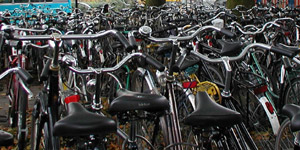 As the entire country is one flat expanse (it’s topographical map looks like a blank sheet of paper), the Netherlands is well suited to this mode of transportation. And, over the course of Dutch evolution, they have developed a plethora of related bike technologies adapted particularly to their needs. There is, of course, the usual bike bags to go on the back and carry your groceries, the multiple configurations of child seats for your bike, flashing lights, bells, speedometers, pant cuff clips for the business professional who doesn’t want to risk getting his pants caught in the gears, rods that connect two bikes together, etc.
As the entire country is one flat expanse (it’s topographical map looks like a blank sheet of paper), the Netherlands is well suited to this mode of transportation. And, over the course of Dutch evolution, they have developed a plethora of related bike technologies adapted particularly to their needs. There is, of course, the usual bike bags to go on the back and carry your groceries, the multiple configurations of child seats for your bike, flashing lights, bells, speedometers, pant cuff clips for the business professional who doesn’t want to risk getting his pants caught in the gears, rods that connect two bikes together, etc.
Unfortunately, bicycle theft is rampant in the Netherlands. And we’re not just talking about your run of the mill “stayed-out-too-late-in-the-red-light-district-and-was-too-drunk-to-recognize-my-own-bike-so-took-the-first-one-available†theft here. We are talking about gangs of street thieves who come prepared with pneumatic bolt cutters, pull up in front of a train station, liberate an entire row of bikes from their chains, throw them in the back of a truck, and speed off. Leaving the owners with the sad prospect of filling out their bicycle insurance claim forms. The very fact that every bike shop sells bike insurance should tell you something.
In order to combat this abuse the Dutch have come up with a very clever defense mechanism: enforced decrepitude. This is the process by which all bicycles are developed in the Netherlands to look like they were put into circulation just after World War II. This way, no single bike stands out. Everyone’s bike is equally ugly and provides only the bare necessity of functionality (i.e., two wheels). Even new bikes are carefully engineered so that when they leave the factory they blend in to the herd of old, rusty, ass-breaking, iron behemoths that constitute the average Dutch bike. Those who flaunt this collective defense do so at their own risk.
When I got to the Netherlands, and realized I would be spending at least two months in the company apartment, I immediately set upon finding a bike. As luck would have it a colleague in the Dordrecht office was just about to move to the New York office, and offered me his bike. I asked him how much he wanted for it and, in very un-Dutch style, he said, “Nothing.â€
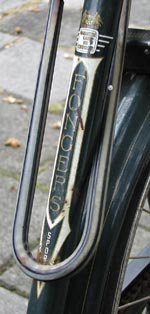 I soon found out why. This bike is actually the prototype that all bikes in the Netherlands are based on. It has no gears. It is at least thirty years old. You have to push back on the pedals to brake. The entire thing is rusty. It is made of lead or some other ridiculously dense metal used only in the manufacture of tanks. And it has a seat whose main goal in life is to prepare you for the horrors of prison life.
I soon found out why. This bike is actually the prototype that all bikes in the Netherlands are based on. It has no gears. It is at least thirty years old. You have to push back on the pedals to brake. The entire thing is rusty. It is made of lead or some other ridiculously dense metal used only in the manufacture of tanks. And it has a seat whose main goal in life is to prepare you for the horrors of prison life.
At first I took this as a challenge to my integration into Dutch culture. If I was going to make it here in the Netherlands I was going to need to get used to the customs of the Dutch people, and that meant taming this beast.
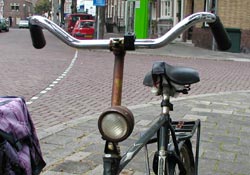 Well, after two weeks I was done. She would not be tamed, that Fongers bicycle of mine. Perhaps it was the height of the seat (which could not be adjusted) which required a running jump to mount, or the difficulty in keeping the bike on course while it shook like a rocket ship on re-entry at speeds greater than five miles an hour. Perhaps it was the fact that my sensitive areas were being abused worse than inmates at Abu Ghraib, I don’t know. But I needed a new bike. One with gears. And brakes.
Well, after two weeks I was done. She would not be tamed, that Fongers bicycle of mine. Perhaps it was the height of the seat (which could not be adjusted) which required a running jump to mount, or the difficulty in keeping the bike on course while it shook like a rocket ship on re-entry at speeds greater than five miles an hour. Perhaps it was the fact that my sensitive areas were being abused worse than inmates at Abu Ghraib, I don’t know. But I needed a new bike. One with gears. And brakes.
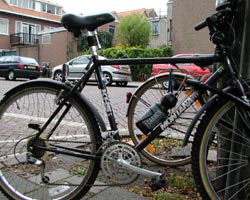 Enter Eynseberg’s bike shop. A fairly large establishment. When I found a mountain bike that I liked there the owner was more than pleased to sell it to me, but would not take my credit card. I went after work one day to purchase the bike. It was 5:15 on Friday. His shop closed at 5:30. The owner said that his registers were closed and that he was having a beer. If I wanted the bike I could run to the ATM and come back with cash, but it had to be within the next 15 minutes. Of course. How rude of me to try and cut into his weekend time BY TRYING TO BUY A FUCKING BICYCLE.
Enter Eynseberg’s bike shop. A fairly large establishment. When I found a mountain bike that I liked there the owner was more than pleased to sell it to me, but would not take my credit card. I went after work one day to purchase the bike. It was 5:15 on Friday. His shop closed at 5:30. The owner said that his registers were closed and that he was having a beer. If I wanted the bike I could run to the ATM and come back with cash, but it had to be within the next 15 minutes. Of course. How rude of me to try and cut into his weekend time BY TRYING TO BUY A FUCKING BICYCLE.
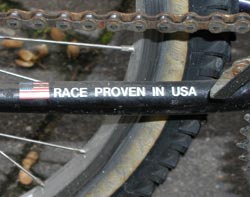 Anyway, I got the bike, and it was like heaven. This bike was a Lexus compared to the Chevette I had been riding. This bike had gears. And brakes. And no rust! Immediately the bike made an improvement in the quality of my life. Okay, so it was purple, and I would not normally purchase a purple bike… but YOU try sitting on that ass-destroying Fongers and then tell me how picky you are about color!
Anyway, I got the bike, and it was like heaven. This bike was a Lexus compared to the Chevette I had been riding. This bike had gears. And brakes. And no rust! Immediately the bike made an improvement in the quality of my life. Okay, so it was purple, and I would not normally purchase a purple bike… but YOU try sitting on that ass-destroying Fongers and then tell me how picky you are about color!
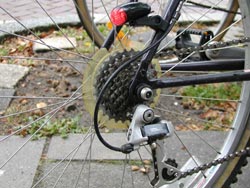 So now, every day, rain or shine, I get on my new Montana bike by KH (race proven in the USA), settle my behind onto the gel seat (with its own shock absorber), zoom down the historic streets of Dordrecht, changing gears at will and giving off a maniacal scream of joy each time, and make the 1.25km trip to work in about 6 minutes.
So now, every day, rain or shine, I get on my new Montana bike by KH (race proven in the USA), settle my behind onto the gel seat (with its own shock absorber), zoom down the historic streets of Dordrecht, changing gears at will and giving off a maniacal scream of joy each time, and make the 1.25km trip to work in about 6 minutes.
Six minutes baby.
I’d like to give a special shout-out to my peeps on the platform at Princeton Junction, waiting for the wretched New Jersey Transit and their wretched staff. Especially to my homeys waiting on the end doors between the third and fourth cars…
Peace out.
Suckers.

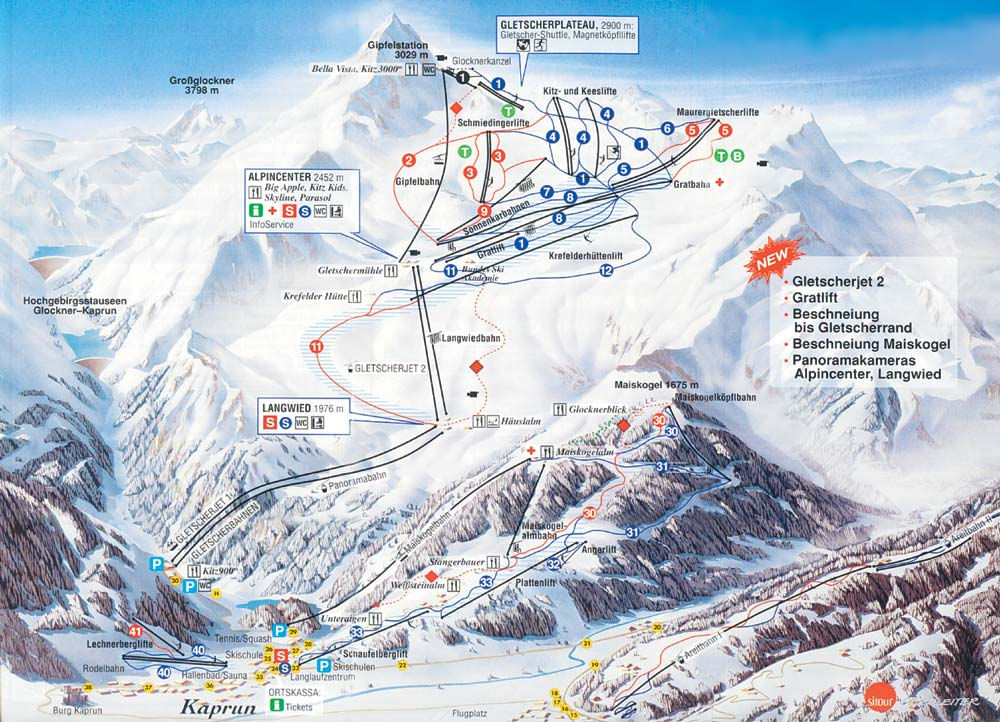
4 Comments
rudie · December 7, 2005 at 10:49 am
i have 2 fongers bike for sale
rudie · December 7, 2005 at 10:50 am
i have a two bike for sale
mochasteak.com » Blog Archive » Bike Stolen · April 5, 2006 at 2:38 pm
[…] Okay, so I left my bike unlocked. But listen to the whole story. I walk out the door this morning and it’s the one day I don’t jiggle my pants to make sure I hear the reassuring clink of my keys. So now I’m locked out of my apartment, something I have been thinking about, and dreading, for a while since we have no spare keys with anyone. […]
Comments are closed.